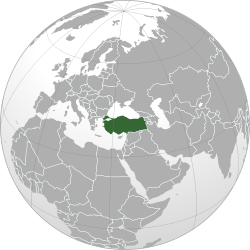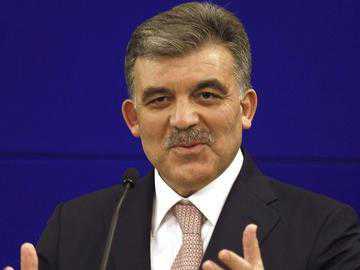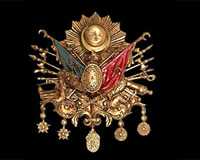By Süreyya Yiğit
Mr. Anders Fogh Rasmussen, the Secretary General of NATO paid an official visit to Turkey on 16 – 17 February 2012. He met with both the President and the Foreign Minister. This visit is important not due to the meetings and outcomes the Secretary General had and arrived at but significant in that it highlighted the sixtieth anniversary of Turkey’s incorporation into the Atlantic Alliance.
On such a solemn occasion Rasmussen declared that “Turkey plays an important role in our operations and we are particularly grateful for your steadfast commitment to our ISAF operation. Turkey has an important voice in our decisions. And Turkey has a vital part to play in shaping our partnerships”.
Then and Now
 Turkey
Turkey
In fact the past six decades have been quite eventful witnessing both strong cooperation as well as deep disagreement between Turkey and fellow NATO members. During this time Turkey, NATO and the whole world has changed, and changed quite drastically. It is very difficult to compare the Turkey of 1952 with that of 2012. Equally, the NATO of 1952 is not the NATO of 2012. Then it had enlarged from 12 to 14 and today it has doubled from that, standing at 28.
Today, the Turkish Republic is an aspiring regional power with a buoyant economy, developing democracy, tried and tested effective military with a population of over 70 million. Sixty years ago, Turkey having avoided military confrontation in the Second World War was only just beginning to benefit from both the Truman Doctrine of 1947 and Marshall Aid, the population standing around 24 million. The economy was hugely dominated by agriculture with poor infrastructure and even worse transportation links. The menacing Soviet diplomatic notes of 1945-46 had driven Turkey into the Western bloc illustrated by her membership of the Council of Europe the year NATO was established. The heavy burden of military costs had taken its toll during the war years and the economy had not been able to diversify by the time of NATO accession, nor in truth was it able to stand on its own two feet.
Within the political and military elite, few had good command of another foreign language which proved to be a major hurdle at times during the Korean War, within which the Turkish Brigade served with distinction. In actual fact much has been attributed to the bravery of the Turkish soldiers easing the path of NATO accession for Turkey. It is certainly true that the casualties incurred by the Turkish brigade were very high and the determination of the Turkish government to defend democracy in the Korean peninsula was second to no other country than the USA, as they were the second country to send military forces to the UN, after the USA.
The Valiant Defense of Korea
The commitment of Ankara for around 5000 troops to be sent to Korea constituted the first military operation in the history of the young republic to take place beyond her national borders. It provided an excellent example of the lengths to which the government was prepared to go to prove its commitment to Western values and security and to highlight Turkey’s place within it.
Douglas Macarthur, as the United Nations Forces Commander in Chief had stated that “The Turks are the hero of heroes. There is no impossibility for the Turkish Brigade.” When Macarthur was sacked and replaced by Ridgway as the commander in chief of the United Nations Forces, he was also to add that, “I had heard of the fame of the Turkish soldiers before I came to Korea. The truth is I had not really believed what I had heard. But I now understand that in fact you are the best and most trustworthy soldiers of the world”. It is due to these statements and more that, legitimately much weight is given to the heroism of the Turkish Brigades in Korea being the decisive element in accepting Turkey as a NATO member.
Conflict on the Horizon
It must be remembered that this was happening at a time when the Cold War had transformed itself into a “hot war” in Asia and was forecast by many to spread to Western Europe. It was a time when Churchill, the wartime British Prime Minister had been returned to office, after spending six long years in opposition, when Eisenhower was no longer the wartime supreme commander but a strong prospect to take over after Truman as American President in 1952. In the Soviet Union, Stalin held all the reins of power. Turkey, having recently ventured into multi-party democracy had experienced its first peaceful transition of power through a free and fair election in 1950 being governed by the new Democrat Party administration directed by President Bayar and Premier Menderes as she became alongside Greece, the two new members within the first ever enlargement of NATO.
It must be stated that most of the Turkish population were not highly informed of military alliances when NATO was formed in 1949, though with the ensuing Korean crisis and Turkish participation, the political and military elite quickly understood the dangers facing western Europe of an expansionary communist ideology espoused by the USSR, which concentrated them into taking a firm decision to join the effort to strengthen western defenses.
An Alliance of Democracies?
To what extent was Turkey a democratic country at the time of accession? To what extent was the United States a democracy in 1952 or Britain for that matter? None of them were true reflections of democracy in practice at that time when viewed through the prism of 2012.
Certainly Turkey lacked the established traditions of a democratic political culture, the USA suffered from institutionalized discrimination in the form of racism domestically and Britain was far from a model of sexual equality and social understanding and cooperation. The idea of Empire still held sway in South East Asia where the British tried to hold onto Malaya and in the Middle East and Africa where British troops were stationed in the Suez Canal with Sudan being denied self-determination. The idea of colonialism and empire was also shared by the French trying desperately to hold onto Indo-China in the Far East and considering Algeria to be French territory but Algerians not the equivalent of French citizens. These were the prevailing values and circumstances that NATO members found themselves in 1952.
All NATO members have since endured a long process of social and political reform which has enabled all to become better models of democracy manifesting the core values of a democratic society where the rule of law is supreme, human rights sacrosanct, toleration a virtue and freedom of speech and choice elevated to the realm of precept. None of the members are perfect models of democracy and some members have further to travel on the road towards the ideal progressive democracy, but the NATO ideal of democracies banding together to oppose communism has succeeded. The collapse of the Berlin Wall and the disestablishment of the Soviet Union robbed NATO of a threat and provided the members a cause to celebrate the fact that the democratic model had triumphed over the autocratic.
End of the Cold War
Whilst some thought that the end of communism meant the end of NATO, that prescription proved to be premature. Turks agreed with the principle that NATO should meet threats to security both within the North Atlantic area and beyond when necessary. Henceforth, the Turkish Republic fully appreciated and emphasized with the American trauma of September 11th, having suffered at the hands of terrorism for decades and subsequently supported the invocation of Article 5.
It provided military assistance as far away as Afghanistan and as recently as in Libya to NATO efforts to bring forth peace and stability to these war-torn, violence-ridden societies, both of whom which incidentally have historic ties to Turkey. Therefore, the sixty years of association with NATO have shaped both Turkey and NATO. Turkey has become stronger militarily, despite setbacks continually expressed her desire for democracy, modernized and diversified its economy, developed the potential of its citizens through education and opportunity and in the post-cold war era begun to tentatively offer its services to enhance security and stability in its region and beyond, which have stretched all the way to the borders of China.
Without a shadow of a doubt sixty years ago Turkey needed NATO to protect herself from a menacing and intimidating Soviet threat. The nuclear umbrella offered by Article 5 was very welcome indeed. After the ending of the Cold War, successive Turkish governments worked tirelessly to expand the security blanket to cover east and central Europe, the Baltic States and the Balkans. In all of their endeavours they proved to be successful as NATO continued to expand. The central mantra was that why other countries should be denied the benefits that Turkey had been enjoying for decades?
Evaluation and Forecast
As one looks at this fairly old and substantial relationship it is noticeable that the integrated military command has proven once again to be a success in the Balkans and greater Central Asia as well as the Middle East and the Mediterranean. Turkish participation was certainly not the decisive element which ensured the success of these missions but they did attest to the fact that NATO members were looking from the same direction when viewing these crises. As the NATO Secretary General admitted that “Turkey does more than just share our security: you shape it. Your experience and your expertise in the Middle East and North Africa are invaluable. They benefit the whole of NATO”.
Certainly there were opposing viewpoints domestically within Turkey as in all the other member states concerning these stances, as there ought to be in vibrant democracies. In the end democratic decisions were taken and steadfastly implemented and aims achieved. This could only be accomplished through a unified stance spearheaded by NATO. Concerning the importance to Central Asia and its environs, a good indication of the vitality of Turkey was evidenced by Rasmussen when sharing his thoughts about the upcoming NATO summit to be held in Chicago in three months time, when he mentioned that “We will have to set out how we will help the Afghan forces take responsibility for security in their own country – and how we will support them once they have done so”.
Therefore, sixty years after entering the Alliance, Turkey possesses and provides a greater role in the enhancement of security within the North Atlantic area and more importantly has transformed itself parallel to NATO into a community of values, sharing and cherishing core values. The relationship has been an enduring one due to one vital factor: mutual values and mutual benefit. Turkey without NATO would have been prone to greater pressure becoming more fragile and NATO without Turkey would have been weaker, missing an essential piece of the jigsaw that provided security for the North Atlantic area. As much as this was true in the past, it is even clearer to see this fact in today’s precarious international environment. The Secretary General summed this up quite succinctly when he stated that “NATO is a family of like-minded countries, a family where we make each other stronger, and Turkey is a valued member of the family”. It is highly likely that this family will continue to be a closely knit one for years if not for decades to come.
Sureyya Yigit, Contributor, ORSAM Eurasia Advisor



